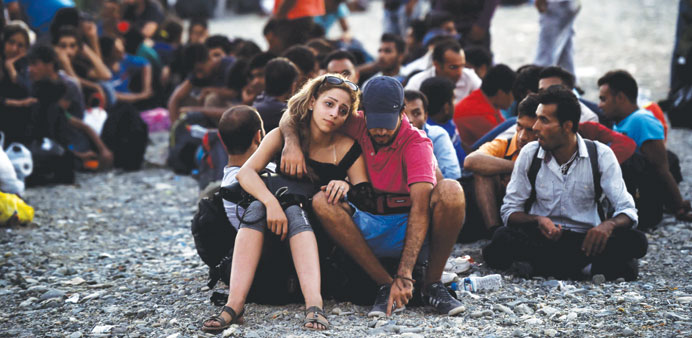A couple waits with other migrants for the train near a train station at the Macedonian village of Gevgelija. The EU is grappling with an unprecedented influx of people fleeing war, repression and poverty in what the bloc has described as its worst refugee crisis in 50 years.
Reuters
Tripoli/Budapest
Seven people died when a boat carrying migrants sank off Libya’s coast yesterday, the second such fatal accident at sea within days, while European leaders struggled to find a coherent policy on the refugee crisis.
The Italian coastguard said some 1,600 migrants had been rescued in the Mediterranean and brought to Italy over the weekend, showing the influx of people, mostly from Africa and the Middle East, remained strong.
At least 2,500 migrants have died since January, most of them drowning in the Mediterranean.
“We had reports this morning that there are seven bodies of illegal migrants that sank off Khoms (east of Tripoli) ... but we don’t have any details how many migrants were on board,” said Mohamad al-Misrati, a spokesman for the Red Crescent in Tripoli.
On Thursday, a vessel packed with people hoping to make it to Italy sank off the Libyan town of Zuwara, killing up to 200 people.
Last week, the dangers faced by migrants on land were exposed when 71 bodies were found in a refrigeration truck in Austria, the biggest migrant death toll on land since the latest surge in migration began nearly two years ago.
A fifth suspect was arrested in connection with that incident, Hungarian police said. Forensic experts said yesterday that the refugees, thought to be Syrians and Afghans, probably suffocated.
As bodies pile up, so does criticism of Europe’s disparate laws and approaches to dealing with asylum seekers.
Some governments have refused to take in refugees and resisted European Union proposals to agree on a common plan.
Others are toughening their asylum policies and border security, sometimes because of rising anti-immigration and nationalist sentiment.
French Foreign Minister Laurent Fabius accused eastern European states, notably Hungary, which is building a fence against migrants along its border, of a “scandalous” policy.
“They are extremely harsh. Hungary is part of Europe, which has values and we do not respect those value by putting up fences,” Fabius told Europe 1 radio.
The interior ministers of Germany, France and Britain have called for an urgent EU meeting to discuss immigration in the next couple of weeks.
Germany said it and a handful of other EU states could not go on taking a disproportionate share of refugees and called on other members to do more.
Berlin expects the number of asylum seekers it receives to quadruple to about 800,000 this year. Two German state premiers said over the weekend the total could even hit 1mn.
European Parliament President Martin Schulz, a German Social Democrat, said those European governments that have resisted European Union proposals to agree a common plan must do more to deal with the crisis, which is intensifying due to a surge in migrants fleeing war and poverty.
“We are not dealing with a failure of the EU, but rather with a glaring failure of some governments, who don’t want to take responsibility and thereby impede a joint European solution,” Schulz told Germany’s Die Welt newspaper. “The governments of some member states must finally remove their blockade and end this unworthy game.”
He did not single out any states.
Britain has a long-standing exemption from EU rules on border issues, along with Ireland and Denmark.
Eastern European states have pleaded immigrants would simply not fit in.
“The current refugee crisis shows what happens when there is less Europe,” Schulz said, adding: “The Mediterranean becomes a mass grave, gruesome scenes play out at borders, there is mutual blame – and those in greatest need, seeking our protection, are left without help.”
Schulz said some EU countries, “who don’t care about European integration”, had prevented agreement on a Europe-wide plan to tackle the refugee crisis.
“That is more than cynical, when one looks at the plight of the refugees.”
British interior minister Theresa May blamed Europe’s borderless system, known as “Schengen”, for fuelling the crisis.
She has demanded tighter EU rules on free movement.
“When it was first enshrined, free movement meant the freedom to move to a job, not the freedom to cross borders to look for work or claim benefits,” May said. “We must take some big decisions, face down powerful interests and reinstate the original principle.”
Some European governments are considering amending the Schengen code, but the European Commission, the EU executive which enforces it, says there is no need to change the rules, either to improve security or control migration.
In Italy, which as the entry point for many migrants has been at the forefront of the crisis, Prime Minister Matteo Renzi said the rising death toll would push EU states to confront the problem.
“It will take months, but we will have a single European policy on asylum, not as many policies as there are (EU) countries,” he said.

